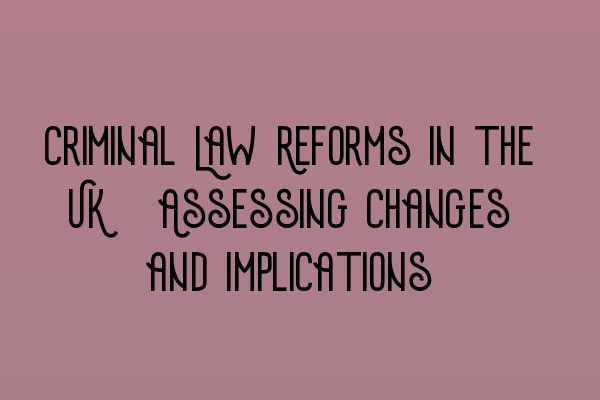Criminal Law Reforms in the UK: Assessing Changes and Implications
The criminal justice system in the United Kingdom has undergone various reforms in recent years, aiming to improve efficiency, fairness, and access to justice. These changes have significant implications for both legal professionals and the general public. In this blog post, we will assess the key criminal law reforms in the UK and discuss their implications for the legal landscape.
1. Sentencing Reforms
One noteworthy change is the introduction of sentencing guidelines that provide detailed instructions to judges on determining appropriate sentences for specific offenses. These guidelines aim to promote consistency and transparency in sentencing, ensuring that similar cases receive similar punishments.
Additionally, recent reforms have focused on the rehabilitation of offenders, aiming to reduce reoffending rates. This includes the development of community sentences and alternative forms of punishment to imprisonment, such as restorative justice and probation programs. The intention is to provide offenders with opportunities for reform and reintegration into society.
2. Technology and Cybercrime
The rapid advancements in technology have led to an increase in cybercrime, necessitating reforms in criminal law to address these emerging challenges. Legislation has been introduced to tackle offenses such as hacking, online fraud, and the distribution of illegal content. This includes the Computer Misuse Act and the Data Protection Act, which provide legal frameworks for prosecuting cybercriminals.
In response to the evolving nature of cybercrime, law enforcement agencies have also focused on enhancing their expertise and resources. The training of investigators and prosecutors in digital forensics and cybercrime investigation has become essential to effectively combat these offenses.
3. Modernization of Legal Processes
The digital age has influenced the modernization of legal processes in criminal law. Courts have increasingly adopted digital technologies, such as electronic case management systems and online filing, to streamline procedures and improve efficiency. This allows for easier access to case information, reduces administrative burdens, and facilitates remote hearings and virtual trials.
Furthermore, reforms have been implemented to improve the experience and support available to victims and witnesses. The creation of dedicated support services and the use of special measures, like video-recorded testimony and screens in courtrooms, aim to minimize distress and encourage greater participation in the criminal justice process.
4. Access to Justice and Legal Aid
An important aspect of criminal law reforms is ensuring access to justice for all individuals, regardless of their financial means. Legal aid provisions have been revised to target areas of greatest need, prioritizing cases involving vulnerable individuals, serious offenses, or wider public interest. However, concerns have been raised about the adequacy and availability of legal aid, particularly in complex cases.
To address these issues, the Solicitors Qualifying Examination (SQE) now assesses a candidate’s competence in criminal law and practice, ensuring that qualified solicitors have the necessary expertise to provide quality representation to clients involved in criminal proceedings. Preparing for the SQE 1 and SQE 2 exams through comprehensive preparation courses is essential for aspiring solicitors seeking to specialize in criminal law.
Conclusion
The criminal law reforms in the UK have aimed to enhance the effectiveness, efficiency, and fairness of the criminal justice system. Sentencing guidelines, technology advancements, modernization of legal processes, and improved access to justice are significant changes that have emerged in recent years.
However, the complexities and challenges of the criminal law landscape require legal professionals to continually update their knowledge and skills. Staying abreast of these reforms and the associated legal implications is crucial for solicitors practicing criminal law in the UK.
To learn more about the SQE criminal law preparation and exam dates, check out these related articles:
- SQE 1 Practice Exam Questions
- SQE 1 Practice Mocks FLK1 FLK2
- SQE 2 Preparation Courses
- SQE 1 Preparation Courses
- SRA SQE Exam Dates
